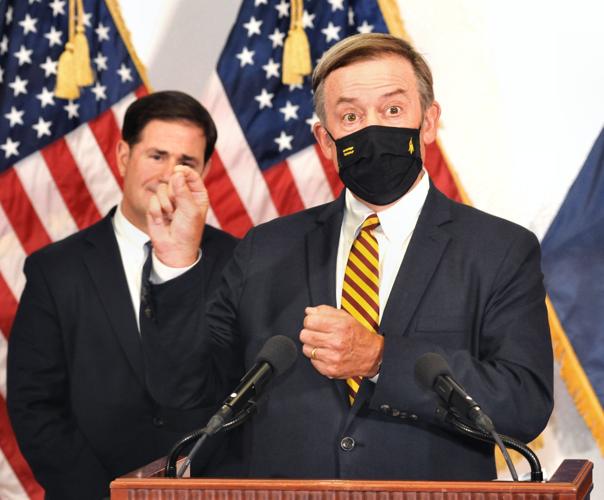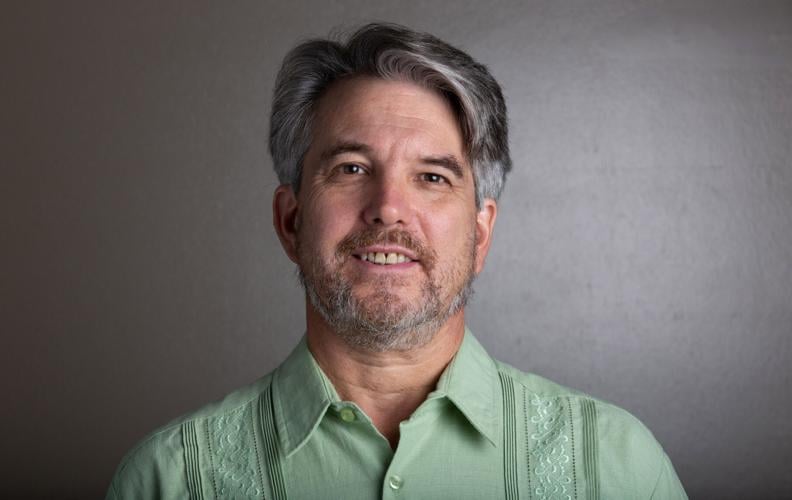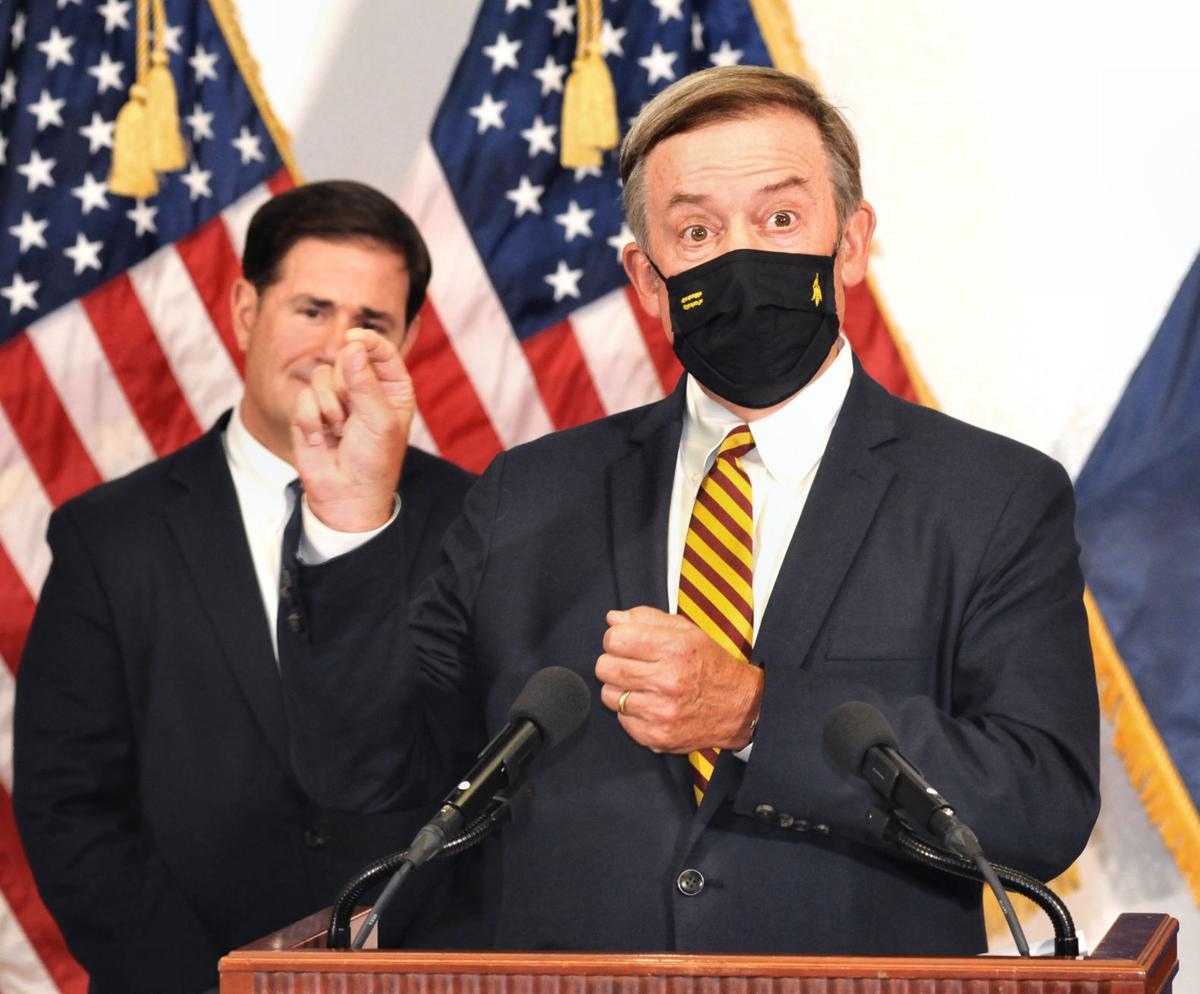For more than a year, Arizona’s state universities have given Gov. Doug Ducey the expertise, cooperation and political cover he needed to fight failure in his response to the COVID-19 pandemic.
This week, he essentially told them to buzz off and let him fail.
Ducey lashed out after Arizona State University announced return-to-campus rules that did not mandate COVID-19 vaccination but made it a pain to return to campus without the shots. Unvaccinated students would have to be tested for COVID-19 twice per week, submit to regular health checks, and wear a mask while on campus.
In other words, the policy strongly encouraged vaccination by making it annoying not to be vaccinated.
That makes sense as a public-health measure. We are trying to reach herd immunity and to stop the virus from mutating. All the data is showing that the vaccines are working well in slowing down the pandemic — they are practically magic.
But Arizona isn’t doing great. We rank in the middle of the pack among U.S. states for vaccination rates, with just 48% of the state’s population receiving at least one shot, and 38% fully vaccinated. By comparison, 59% of the populations of New Mexico and California have received at least one shot, with about half of both neighboring states fully vaccinated.
Ducey himself continues to say he wants people to get vaccinated.
But he has a funny way of showing it. In a strange overreaction, Ducey took to Twitter on Monday to denounce the new rules established by ASU, his alma mater.
“This policy is social engineering at its worst,” Ducey said. “Health policy should be based on science, not virtue signaling. In America, freedom wins.”
“Virtue signaling,” by the way, is a relatively recent phrase that means, essentially, “posturing.”
It would not be surprising if university administrators and researchers were left speechless by Ducey’s slap. They spent a year giving Ducey new testing methods at the outset of the pandemic, testing sites during the pandemic, important research on immunity and gene sequencing, as well as massive vaccine sites in recent months, only for him to hit them with this.
He owed them better, but he’s a politician whereas many of them are simply experts at epidemiology, biostatistics, virology, gene sequencing and other specialties.
The politics motivated this, as Charlie Kirk, president of the conservative group Turning Point USA, noted in a tweet about Ducey opposing mandatory vaccinations for students. “This is a winning issue,” he said.
It’s also a decision with bad side effects.
By referring to vaccine rules as “social engineering,” Ducey is opening up a debate anti-vaccine activists would love to have about all the other required immunizations we receive. Polio, MMR, tetanus, whooping cough — Ducey’s phrasing implies he thinks those miraculous, life-saving vaccines we require are just “social engineering,” too.
And by calling an effort to achieve vaccination “virtue signaling,” Ducey signaled that he doesn’t really value vaccines. He just says he does.
I happen to have a dog in this fight. One of my kids is going to a state university this fall. As it turns out, earlier this year I spent time scrounging around for immunization records, scanning them and sending them off.
You have to show proof of a measles, mumps and rubella vaccine before you can attend an Arizona state university. We accept that because it’s good public-health policy. It is neither “social engineering” nor “virtue signaling.” It works to prevent epidemics, just like the coronavirus vaccine does.
Now, there may be details of ASU’s policy that were unnecessary. Forcing an unvaccinated person to wear a mask outside is not likely to be helpful in stopping the virus from spreading.
But those are relatively small details that Ducey could have probably worked out in a phone call to Michael Crow, the longtime ASU president. Instead, Crow toured the radio shows in Phoenix Tuesday explaining the policies and responding to Ducey’s criticisms.
“Some people want it to be over when it’s not quite yet over,” Crow told KTAR radio host Larry Gaydos, whose mother died of COVID-19 last year.
Keep in mind the universities bring together thousands of students from all over the world. The University of Arizona was the focus of an outbreak that began as soon as students returned to Tucson in August and continued for weeks before they got it under control.
That was a time between the periods of Ducey’s epic pandemic flops, when Arizona twice suffered among the worst outbreaks in the world — in June-July, 2020, and again in December 2020 and January 2021. University experts were there to help him find his way out of those holes, but now he’s insistent on digging again.
Tim Steller is an opinion columnist. A 25-year veteran of reporting and editing, he digs into issues and stories that matter in the Tucson area, reports the results and tells you his conclusions.
Contact him at tsteller@tucson.com or 520-807-7789. On Twitter: @senyorreporter
A Desert spiny lizard visits this northwest homeowner frequently enough for snacks that homeowner Derrick Smith asks "At what point do I have to claim him as a pet?" Video courtesy of Derrick Smith.







